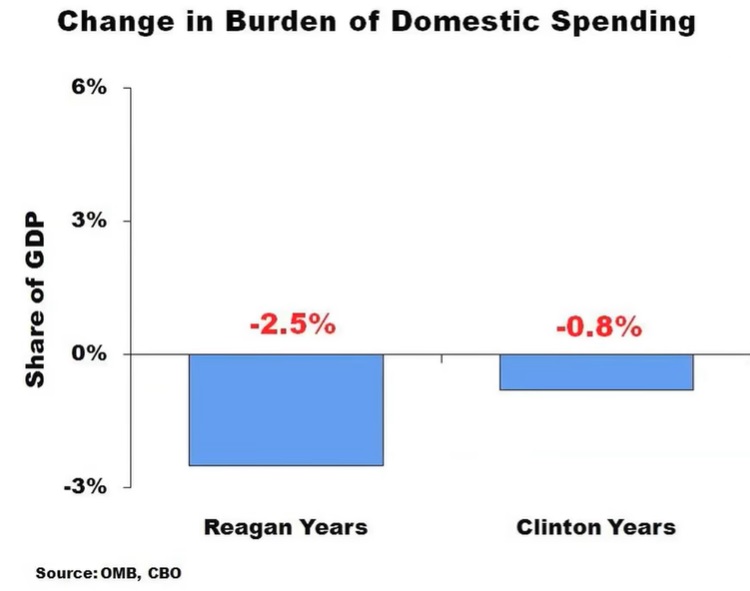Even though America’s long-run fiscal outlook is very grim, I wrote a two-part series earlier this year (here and here) to explain why the situation is not hopeless.
First and foremost, I noted that the only good solution is long-run spending restraint. Fortunately, that’s been done before. There have been three periods of good fiscal policy in recent decades.
And I also explained that we already know what specifically needs to be done to fix entitlements (which unambiguously are the cause of our long-run problems).
In other words, we know the problem, we know how to solve it, and history shows that periods of fiscal restraint are possible.
I’m not the only one who is expressing optimism.
Two former Senators, Rob Portman (R-OH) and Kent Conrad (D-ND), have a column in yesterday’s Washington Post about the need to address America’s fiscal problems.
And they also don’t think the situation is hopeless. Here’s their core argument.
The deficit has doubled in the past year, and the national debt — some $33 trillion… — is diminishing our standing in the world. It is immoral to leave this level of debt to our children and grandchildren, and it is alreadyaffecting our economy. …But this is not a hopeless situation. …it is time to try an approach that removes some of our divisive politics from the picture: Congress must establish a bipartisan commission to put the country on a sustainable fiscal path. …Democrats will resist many of the necessary spending reductions, Republicans will resist needed revenue increases, and Democrats and Republicans alike will balk at the needed reforms to entitlement programs. But this approach has repeatedly helped move the country out of stalemate in the past. …our near- and long-term fiscal outlook is dangerously unsustainable. A fiscal commission should explain in objective terms the fiscal crisis we face and its consequences, scrutinize the entire federal budget, and make specific recommendations on revenue and spending, including what should be done to rescue our entitlement programs from insolvency. …A bipartisan commission might be our best chance to bestow upon future generations a stable financial future rather than an overwhelming financial burden and an America in decline.
I’m glad that these two former lawmakers are calling attention to our fiscal mess.
That being said, I have two big concerns with their argument.
- They focus on red ink, which should be viewed as a symptom. The real problem is excessive spending. Real-world evidence shows that if you cure the underlying disease of excessive government, you automatically solve the symptom of deficits and debt.
- They explicitly – and mistakenly – open the door to tax increases. But once taxes are on the table, we know from history that the result will be a deal filled with (very bad) tax increases and make-believe (and quickly vanishing) spending restraint.
Interestingly, the New York Times accidentally did some research that proves my case.
In an article back in 2011, Catherine Rampell looked at various bipartisan budget deal to measure the ratio of tax increases to (supposed) spending cuts.
What she found was that only one budget deal had zero tax increases, the one in 1997. Indeed, that budget deal actually cut taxes.
And guess what? That was the only budget deal that produced a budget surplus.
The moral of the story should be obvious.
P.S. Senators Portman and Conrad seem to think that Simpson-Bowles budget plan is a good framework, but I explained in 2012 and 2013 why that plan would be an unmitigated disaster.
P.P.S. My opposition to higher taxes is practical rather than ideological. Back in 2012, I listed three big tax increases I would accept assuming politicians would be willing to make some long-overdue spending reforms. Suffice to say nobody on the left has been willing to accept that offer.


